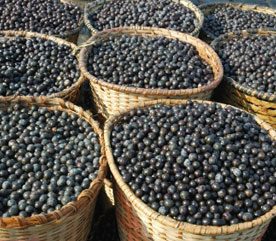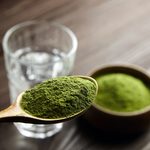The Antioxidant Myth
Free radicals bad, antioxidants good, right? For the supplements industry, the truth might be a hard pill to swallow

Cranberry capsules.Green tea extract. Effervescent vitamin C. Pomegranate concentrate. Betacarotene. Selenium. Grape seed extract. Vitamin E. Pine bark extract. You name it, if it’s an antioxidant, we’ll swallow it by the bucketload, in the belief it’ll promote good health and stave off disease. But is this really the case?
Well, evidence gathered over the past few years shows that, at best, antioxidant supplements do little or nothing to benefit our health. At worst, large doses could have the opposite effect, promoting the very problems they are supposed to stamp out.
It’s little surprise that antioxidants have acquired a reputation as miracle health supplements. Decades ago, scientists found that highly destructive chemicals called free radicals were linked to many conditions, including heart disease, stroke, cancer, diabetes, Parkinson’s, Alzheimer’s, cataracts and arthritis.
Free radicals are compounds with unpaired electrons that stabilise themselves by oxidising other molecules (in effect biologically “rusting” them) – including proteins, carbohydrates, lipids and DNA. In the process, they often create more free radicals, sparking off a chain of destruction. Free radicals and other reactive oxygen species (ROS) are by-products of respiration and therefore are an unavoidable hazard of being alive.
“One per cent or more of the oxygen we consume turns into ROS,” says biochemist Barry Halliwell from the National University of Singapore. “Over a year, a human body makes 1.7kg of ROS.” Exposure to X-rays, ozone, tobacco smoke, air pollutants, microbial infections and industrial chemicals also triggers free-radical production, as does intensive exercise.
In the 1980s, however, a potential weapon against free-radical damage appeared. Scientists had long known that people whose diets are rich in fruit and vegetables have lower rates of heart disease, diabetes, dementia, stroke and certain types of cancer – the very diseases associated with free-radical damage. Now there was an explanation. Fruit and vegetables are a rich source of antioxidants that can neutralise free radicals. A hypothesis was born: “Scientists assumed that these antioxidants were protective, and that taking them as supplements or in fortified foods should decrease oxidative damage and diminish disease,” says Halliwell, who pioneered research into free radicals and disease.
“It was simple: we said, ‘Free radicals are bad, antioxidants are good.'” The concept helped spawn a huge industry. According to the US National Institutes of Health (NIH), at least half of US adults take some form of supplement, spending US$23 billion ($30 billion) a year, though it’s hard to say how much of this goes specifically on antioxidants.
Research estimates that the antioxidant market has grown by 18% in the past year alone. The best-known antioxidants are vitamin E (tocopherol), vitamin C, and two broad classes of plant chemicals called polyphenols (which include flavonoids) and carotenoids (including betacarotene and lycopene). Most supplements touted as antioxidants contain at least one of these, often as a pure chemical and sometimes as a concentrated plant extract. Since the early 1980s, scientists have been putting these compounds through their paces, using double-blind randomised controlled trials – the gold standard for medical studies.
Time and again, however, the supplements have failed the test. True, they knock the wind out of free radicals in a test tube. But once inside the human body, they seem strangely powerless. Put to the test Betacarotene was the first antioxidant to produce lacklustre results. In the early 1980s, the US National Cancer Institute set about testing its usefulness as a preventative for cancer.
For one trial that began in 1994, the NCI recruited more than 18,000 people at high risk of developing lung cancer, either because they smoked or from exposure to asbestos, and gave around half of them betacarotene in combination with vitamin A. The researchers pulled the plug 21 months early after discovering that those taking supplements were faring worse than the controls. Their lung cancer rate was 28% higher, and the overall death rate was up 17%. “It was a shock. It not only did no good but had the potential to do harm,” Halliwell says.
Further trials have added weight to these findings, and in May this year, an expert panel convened by the NIH concluded there was no evidence to recommend betacarotene supplements for the general population, and strong evidence to recommend that smokers avoid it. It’s a similar story with the world’s most popular antioxidant. Vitamin E shot to fame in the early 1990s, after two large studies – they involved more than 127,000 people in total – found that those with a diet high in vitamin E were significantly less at risk of developing cardiovascular disease.
The first study followed 87,245 female nurses for eight years; it found that the top 20% with respect to vitamin E consumption had a 41% lower incidence of cardio-vascular disease than the bottom 20%. The second study, involving 39,910 male health professionals, found a similar drop in heart disease risk. The researchers, based at Harvard Medical School and Harvard School of Public Health, even had a plausible mechanism.
Evidence was emerging that one of the causes of heart disease was free-radical damage to LDLs – tiny packages of lipid and protein that circulate in the bloodstream, delivering fatty acids to cells. It turned out that adding vitamin E to blood samples in the test tube made LDL more resistant to oxidation. Perhaps this was how vitamin E prevented heart disease.
“At the biochemical level, the rationale sounded so good – at that time,” says Roland Stocker, a biochemist at the University of New South Wales. Use of vitamin E supplements soared. In 1990, almost nobody took vitamin E; by the end of the decade, an estimated 23 million US citizens were knocking back daily doses. Other researchers set up large studies using vitamin E supplements, but the results have almost always been disappointing. The Cambridge heart antioxidant study found a positive effect – a 77% reduced risk of non-fatal heart attack – but several others found no protective effect.
One even concluded that vitamin E increased the risk of heart failure.
Time for a rethink?
Other trials to test whether vitamin E supplements could prevent cancers and Alzheimer’s were also negative. What’s more, scientists couldn’t find evidence that vitamin E protected LDL against oxidation in the body – except in people with vitamin E deficiency.
Angelo Azzi, a biochemist at Tufts University in Boston, points out that vitamin E exists in eight different forms in nature, all of which function as antioxidants in the test tube. Yet the body uses only one form, alpha tocopherol, which is pulled out of the bloodstream by a highly specialised protein in the liver. All the other forms are largely excreted. Azzi argues that evolution is unlikely to have gone to such great lengths simply to obtain an antioxidant from the diet.
“There are hundreds of antioxidants in nature even better than vitamin E that are discarded by the body,” he says. Vitamin E is an essential part of the diet and deficiency leads to neurological problems, but whatever its role in the body, it’s not an antioxidant.
Vitamin C is another disappointment
“People are still trying to defend it, but you don’t get an effect on free-radical damage unless you start with people with a vitamin C deficiency,” says Halliwell. “I think it’s a lost cause.” In fact, results from the vast US Women’s Health Study suggest vitamin C supplements may accelerate atherosclerosis in some diabetics.
One class of antioxidants that is still relatively unresearched is polyphenols. These again act as antioxidants in the test tube, but it is not clear how long they stay in the bloodstream. For example, most of the flavonoid called resveratrol – the polyphenol found in red wine – is rapidly broken down and cleared from the body.
The secret ingredient?
The conclusion is becoming clear: whatever is behind the health benefits of a diet rich in fruit and vegetables, you can’t reproduce it by taking purified extracts or vitamin supplements. “Just because a food with a certain compound in it is beneficial to health, it does not mean a [pill containing the same compound] is,” said Paul Coates, who works in the Office of Dietary Supplements at NIH.
Yet the fact remains that people with diets abundant in vitamins C and E, polyphenols and carotenoids are less likely to suffer heart attacks, vascular disease, diabetes and cancer. One explanation is that these people have a generally healthier lifestyle – but no-one knows for sure.
More evidence needed
There are some ideas. Halliwell still believes that antioxidants are at least partly responsible. He argues that because the polyphenols, carotenoids and vitamins in fruit and vegetables are bound into tough, fibrous material, they hang around in the stomach and colon, where they can neutralise free radicals – the gastrointestinal tract is constantly generating ROS from food.
Supplements may be digested too quickly to replicate this effect. However, Andrew Shao from the Council for Responsible Nutrition, a US supplements industry association, questions whether it is fair to test antioxidants using a drug model.
He says that pulling a nutrient out of context and testing it in a clinical trial is not appropriate. “Antioxidants should not be expected to perform as drugs,” he says. “That’s simply not how nutrients work. They work in concert with each other.”
There’s yet another, more intriguing explanation. Among the leading sources of dietary antioxidants are tea and coffee, and there is some evidence that green tea in particular has health benefits. Oddly, though, Halliwell has discovered that tea and coffee are also bursting with ROS, so how can they be beneficial?
“There has been a considerable rethink as to what free radicals are doing,” says Malcolm Jackson, a biochemist at the University of Liverpool in the UK. He believes that in the right quantities, radicals can be positively health-enhancing, prompting our cells to fire up their own defences: radical-busting enzymes such as catalase and superoxide dismutase.
“Cells are very good at protecting themselves against stresses, as long as they’re not excessive,” says Jackson. “The question is: should we be quenching free radicals at all?” If antioxidants in food work because they generate health-promoting quantities of free radicals, that would be an ironic turnaround.
In supplements, it could be that the doses are too high, producing too many free radicals. For now, the advice is simple. “Stick to flavonoid-rich foods, red wine in moderation, tea, fruit and vegetables,” says Halliwell. “Don’t start taking high-dose supplements or heavily fortified food until we know more.”



